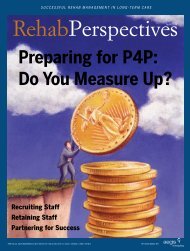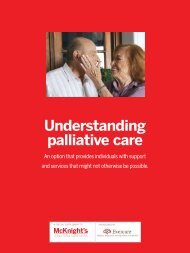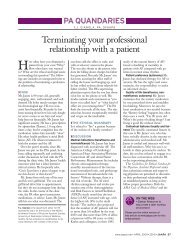Essential Guide to E-mail Marketing - Haymarket
Essential Guide to E-mail Marketing - Haymarket
Essential Guide to E-mail Marketing - Haymarket
Create successful ePaper yourself
Turn your PDF publications into a flip-book with our unique Google optimized e-Paper software.
24 INFRASTRUCTURE DM News • E-Mail <strong>Marketing</strong> <strong>Guide</strong> 2007<br />
INFRASTRUCTURE<br />
Page 24<br />
It starts with reputation,<br />
by J.F. Sullivan, Habeas<br />
Thinking beyond deliverability,<br />
by Ellen Siegel, Constant Contact<br />
Page 26<br />
CAN-SPAM, four years on, by<br />
Jeremy Saibil, Campaigner<br />
Page 28<br />
E-<strong>mail</strong> authentication: It’s time,<br />
by Al Iverson, ExactTarget<br />
How marketers can prevent spam<br />
complaints, by Ben Chestnut,<br />
MailChimp.com<br />
Page 30<br />
Keep your e-<strong>mail</strong> safe from legal<br />
challenges, by Zafar Khan, RPost<br />
Questions and answers about<br />
sending reputation, by George<br />
Bilbrey, Return Path’s Sender<br />
Score<br />
Page 32<br />
Spam finally has a definition, by<br />
Jordan Cohen, Epsilon<br />
Controlling messaging costs, by<br />
Barry Abel, Message Systems<br />
Infrastructure<br />
E-<strong>mail</strong> delivery is no longer just about whether or not you get in<br />
the inbox, as reputation systems and feedback loops have become<br />
commonplace. All e-<strong>mail</strong> marketers must be fluent in the issues of<br />
reputation, moni<strong>to</strong>ring, CAN-SPAM, authentication, preventing spam<br />
complaints, auditing e-<strong>mail</strong>s and ISP relations.<br />
It starts with<br />
reputation<br />
BY J.F. SULLIVAN<br />
Vendors are doing their best <strong>to</strong> get marketers<br />
<strong>to</strong> take seriously the issues of moni<strong>to</strong>ring<br />
and maintaining online reputation. Within the<br />
once-tiny industry of<br />
e-<strong>mail</strong> deliverability,<br />
there are now more<br />
companies springing up<br />
<strong>to</strong> give you a snap-shot<br />
of your online reputation<br />
than pho<strong>to</strong>graphers<br />
following Paris Hil<strong>to</strong>n.<br />
Why is that?<br />
In reality, much of<br />
what people refer <strong>to</strong> as<br />
J.F. Sullivan<br />
Habeas<br />
reputation is not new. It<br />
has existed for years,<br />
mostly in the form of anti-spam blacklist services.<br />
As anti-spam techniques became more complex<br />
and mature, the concepts of whitelists sprung up<br />
as a form of positive reputation.<br />
In more recent years, ISPs have also been<br />
developing their own metrics for reputation in<br />
the form of collected user complaints. This “feedback<br />
reputation” has been dangled over the<br />
heads of senders for years now, like a Sword of<br />
Damocles ready <strong>to</strong> slice and dice the <strong>mail</strong> of any<br />
sender flagged by the ISP’s users.<br />
A number of anti-spam content analysis vendors<br />
have also begun repositioning themselves as<br />
being in the business of helping senders enhance<br />
and improve their reputation through a variety of<br />
add-on <strong>to</strong>ols.<br />
Lest anyone wonder, we at Habeas confess that<br />
for the last several years we have been aggregating<br />
and maintaining a reputation data network. Our<br />
database contains reputation information on several<br />
million receiving systems and networks, allowing<br />
us <strong>to</strong> build a detailed picture of how senders<br />
are perceived by receivers around the world.<br />
If reputation is truly a lot of old processes<br />
wrapped in a trendy new name, why all the<br />
ESSENTIAL GUIDE<br />
sudden fuss?<br />
Simply put: Senders are beginning <strong>to</strong> lean more<br />
and more heavily on reputation data in order <strong>to</strong><br />
make the kinds of delivery decisions that mean<br />
life or death for e-<strong>mail</strong> marketing campaigns.<br />
One of the events that crystallized the issue<br />
was Microsoft’s recent announcement that it will<br />
begin throttling the connections of new senders,<br />
not by whether they were on a whitelist, but solely<br />
by the established reputation of that sender.<br />
Microsoft’s assessment of senders’ reputations<br />
incorporates a number of fac<strong>to</strong>rs, including individual<br />
and aggregated views of sending volumes,<br />
complaint rates and a variety of technical and<br />
infrastructure characteristics, all measured and<br />
assessed over time.<br />
Why should you care about how ISPs view<br />
your e-<strong>mail</strong> reputation? It really boils down <strong>to</strong><br />
whether you are interested in maintaining the relationships<br />
you enjoy <strong>to</strong>day with your cus<strong>to</strong>mers.<br />
In this new world of e-<strong>mail</strong> reputation, all the<br />
old rules apply with regard <strong>to</strong> message content<br />
and construction. But whereas you might have<br />
found blacklists, whitelists and other reputation<br />
information <strong>to</strong> be little more than an inconvenience<br />
or an annoyance in the past, the future is<br />
going <strong>to</strong> be very different.<br />
Your cus<strong>to</strong>mer relationships are going <strong>to</strong> start<br />
with that reputation, or your cus<strong>to</strong>mer relationships<br />
won’t be relationships at all.<br />
J.F. Sullivan is vice president of marketing at Habeas.<br />
You can reach him at jfsullivan@habeas.com.<br />
Thinking beyond<br />
deliverability<br />
BY ELLEN SIEGEL<br />
According <strong>to</strong> the December 2006 ESPC/Ipsos<br />
E-<strong>mail</strong> Survey, most consumers decide <strong>to</strong><br />
delete e-<strong>mail</strong>s or report them as spam based on<br />
their “from” and “subject” lines, and nearly 80<br />
percent do so without ever opening them. Hence<br />
it is critical for small businesses <strong>to</strong> understand the<br />
importance of reputation and trust if they want
















